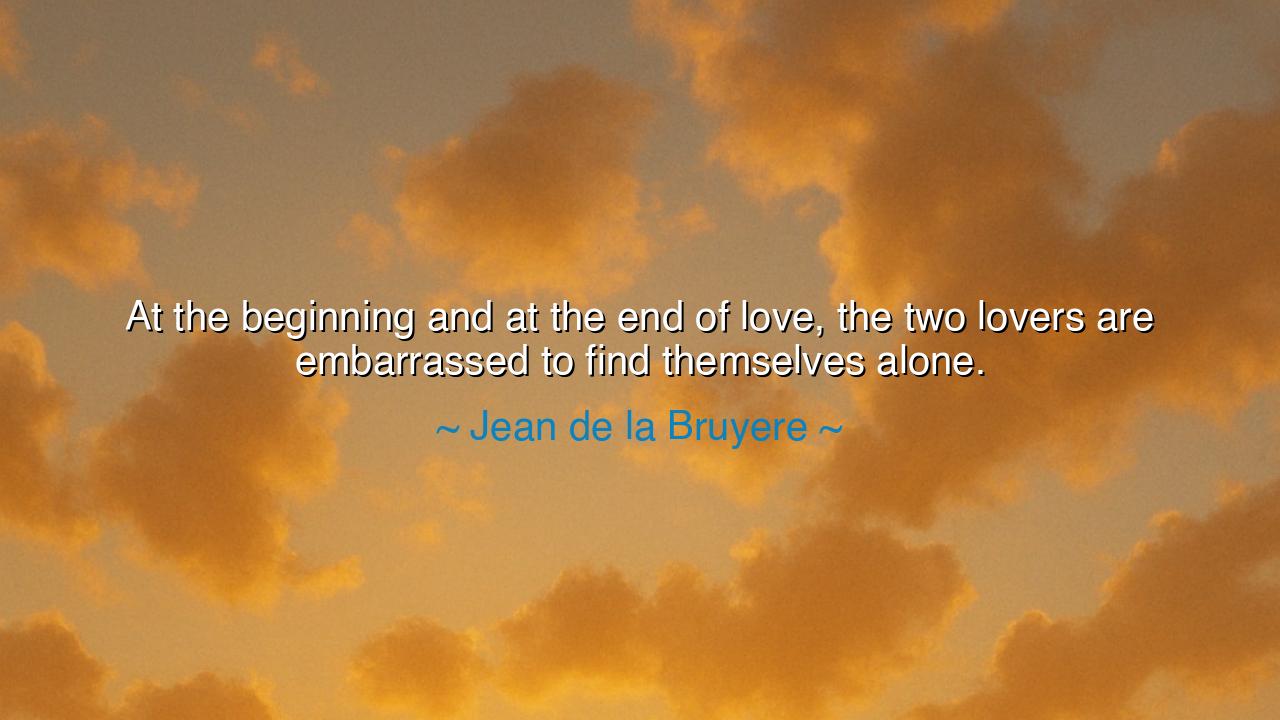
At the beginning and at the end of love, the two lovers are
At the beginning and at the end of love, the two lovers are embarrassed to find themselves alone.






In the delicate and timeless words of Jean de La Bruyère, the keen observer of human nature and courtly life, we find a truth both tender and piercing: “At the beginning and at the end of love, the two lovers are embarrassed to find themselves alone.” These words, written in seventeenth-century France, emerge not from mere sentiment, but from the deep wisdom of observation—from a man who had watched the dance of hearts, their approach and retreat, the way passion blooms like dawn and fades like twilight. In this single sentence, La Bruyère captures the full circle of love: its trembling birth and its silent death, its intimacy and its solitude, its fire and its ashes.
To understand his meaning, we must see how love, in its beginning, is a sacred uncertainty. When two souls first meet in the quiet of affection, their hearts are not yet fluent in one another’s language. They stand, as it were, on the threshold of a vast and unknown country. There is embarrassment—not of shame, but of awe. Each feels exposed before the mystery of the other, both drawn together and yet afraid to touch too closely the delicate flame that might consume them. In the early hours of love, the presence of the beloved is overwhelming; silence weighs heavy because each fears to speak the wrong word, to disturb the enchantment that hovers between them. Thus, even in union, there is hesitation—the beautiful awkwardness of hearts learning how to beat together.
But when love ends, the same scene repeats in sorrowful reflection. The two lovers, who once spoke easily and breathed as one, find themselves again embarrassed to be alone together—this time not with wonder, but with weariness. The words that once bridged their souls now fall into emptiness. What was once sacred closeness becomes unbearable nearness. The eyes that once could not look away now struggle to meet. They are again as strangers, though they carry within them all the memories of what once burned brightly. This is the tragedy of intimacy—that the beginning and the end of love mirror each other, like sunrise and sunset, both beautiful, both fleeting, both wrapped in silence.
La Bruyère, a philosopher and moralist of the French court under Louis XIV, saw in the elegance and vanity of his age the eternal patterns of the human heart. His “Characters” were portraits not of nobles, but of the soul—its pride, its longing, its fragility. He wrote in an age of wit and restraint, yet his insight cuts across centuries, for love has not changed in its essence. Whether whispered in candlelight or over the glow of modern screens, it begins with wonder and ends, often, with discomfort. The embarrassment he describes is the quiet recognition that what once felt infinite has returned to the fragile boundaries of self—that two hearts, after merging, must once more stand apart.
History offers many mirrors to this truth. Think of Napoleon and Josephine, whose love began in letters of fire and ended in silence. Their first meetings were filled with awe and uncertainty, each marveling at the other’s brilliance. Yet, as ambition and fate drove them apart, they too found themselves strangers again—embarrassed by what they had once shared. Or recall the poet John Keats, who wrote of love’s first tremor—“I am afraid that it may be love,”—a confession of both joy and fear. He knew, as La Bruyère did, that to love deeply is to walk willingly into both tenderness and pain.
What La Bruyère teaches us is that love is cyclical, bound by the same vulnerability at both its dawn and its dusk. The embarrassment he speaks of is not a flaw, but a mark of our humanity. It reminds us that love is not ownership, but encounter; not certainty, but wonder. When two people fall in love, they step beyond the safety of solitude into the trembling unknown of connection. And when love fades, they must learn again to inhabit the solitude they once left behind. In both moments, the soul stands naked—before another, and before itself.
The lesson, then, is one of compassion and awareness. Do not mock the awkwardness of beginnings, nor despair at the silences of endings. They are both sacred moments in the grand rhythm of love’s life. At the start, let your shyness be a sign of respect for the mystery unfolding. At the end, let your discomfort be a sign of gratitude—for you have known something that changed you. Every love, however brief, leaves a trace of truth behind, a deeper knowledge of what it means to be human.
So, remember this, O listener: love begins with trembling and ends with silence, but both are holy. When you find yourself embarrassed to be alone—at love’s first awakening or at its final fading—know that you are standing in the very heart of what it means to live. For to love, even once, is to have walked through both the light of dawn and the hush of dusk, and to have discovered that both belong to the same beautiful and eternal day.






AAdministratorAdministrator
Welcome, honored guests. Please leave a comment, we will respond soon